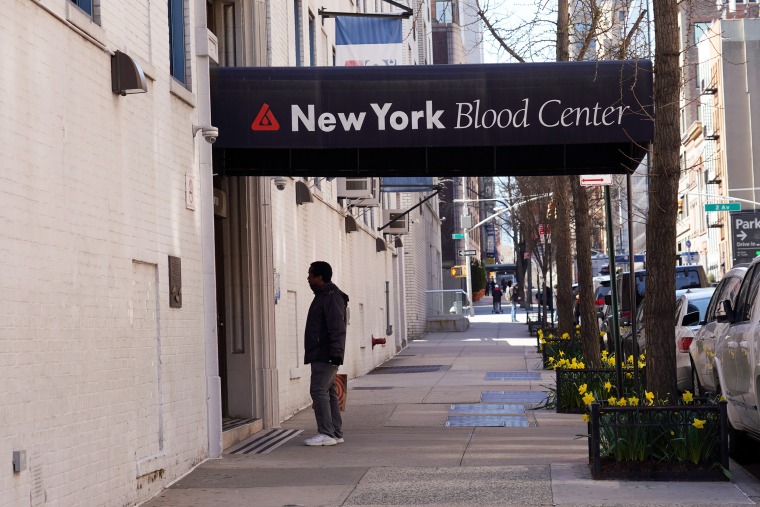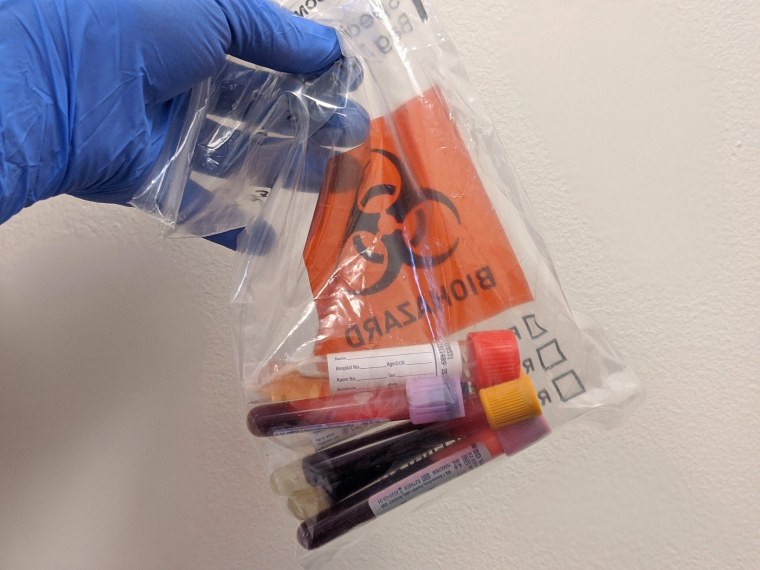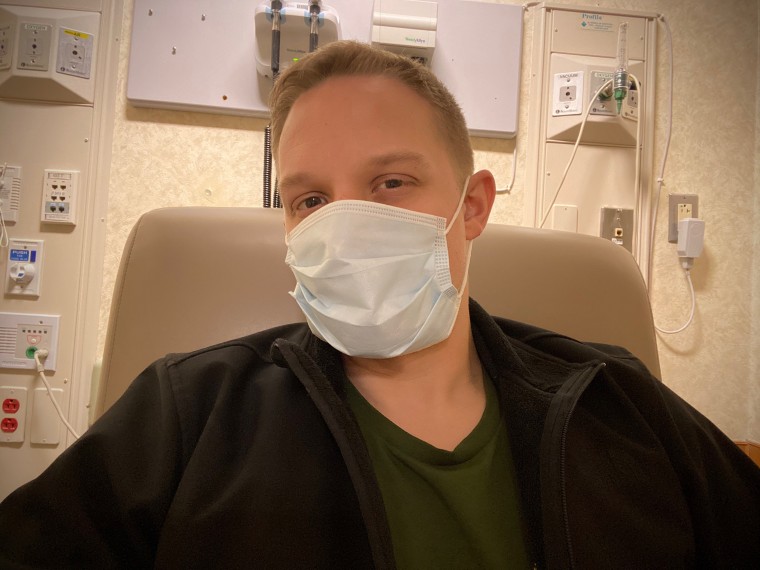After the Food and Drug Administration changed the rules for blood donations from gay and bisexual men earlier this month, coronavirus survivor Lukus Estok saw an opportunity to help other patients recover from the disease.
For years, the FDA has restricted men who have had sex with men in the preceding year from donating blood, but loosened its rules on April 2 as a way to address a sharp drop in donors during the coronavirus outbreak.
Within days, Estok tried to donate blood plasma for a test program in New York City that treats severely ill COVID-19 patients with plasma from patients who have developed antibodies and recovered from the disease. He said he was turned away after revealing he was gay.
"I was shocked," said Estok, 36. "I've been through a month of hell with this virus. I'm finally recovered. I've been through a screening process that tells me I'm a potential candidate to help somebody else and now I'm being told I can't."
NBC News found that despite the rule change hundreds of the nation’s blood centers are still unable to accept blood from gay men, even though there's a desperate need for blood at U.S. hospitals and a desire to get plasma with antibodies from COVID-19 survivors. Both the Red Cross and America's Blood Centers, which together represent 800 banks nationwide, told NBC News they haven't been able to accept donations.
Estok and other gay men who have tried to give blood since April 2 have been unable to do so because many blood donation centers have not yet trained staffers or updated their computer systems to accommodate the new rule. It's also because a trade group to which nearly all U.S. blood banks belong has not yet gotten approval for an important document from the FDA.

In 1985, as a way to block the transmission of HIV, the FDA blocked all men who had had sex with other men after 1977 from donating blood. The rule was changed to sex within the past 12 months in 2015, and then to sex within the past three months on April 2.
Gay and bisexual men began showing up at blood banks to donate immediately, only to be turned away.
Estok was trying to donate his blood plasma as a part of the Mount Sinai hospital system's blood plasma therapy program. He found out about the program through friends and knew he wanted to donate his plasma to help others who were sick.
"Having gone through a bit of a horrific experience with the virus and feeling pretty grateful to have come out the other side, I reached out to Mount Sinai," said Estok.
After multiple screenings, Estok said Mount Sinai called him and said his blood had sufficiently high levels of the needed antibodies and that New York Blood Center would be in touch to schedule an appointment. But once he arrived at New York Blood Center, Estok was told he would be unable to donate.
"I was not expecting the reaction I got," said Estok on when he told the staff he was gay. "It was like I was radioactive."
In an exchange that Estok recorded on his phone, the NYBC staff explained to him that they had not yet implemented the FDA's new guidelines and that the process was "complicated." Estok was forced to go home without donating plasma.
"I was so upset," said Estok. "I genuinely want to be able to contribute to help somebody and right now they're basically putting out messages that they need blood that there's shortage of blood. But at the end of it, they sent me home."
An NYBC staffer denied that a potential donor would be asked if he were gay, saying the donor would instead be asked about sexual activity with another man during the past 12 months.
Brandon Gunther, 24, of Sacramento, California, had a similar experience. He attempted to donate at a local blood bank, believing he was eligible under the new guidelines, but was turned away after revealing his sexual history.
"I hadn't had sex in the past three months so figured I was good to go," said Gunther. "But the computer rejected my eligibility to donate and I was told 'you have to remain abstinent from male to male sex for at least one year to be eligible to donate.'"
Gunther says the experience felt discriminatory and jarring.
Blood bank representatives told NBC News the experience has also been frustrating for them, especially since they have been pushing for relaxation of the rules for years. The blood centers can't just flick a switch and change their rules for donation, they say -- making such changes can take months.

Linda Goelzer, a spokesperson for Carter BloodCare in Dallas, said "tons" of people showed up at their facilities the day after the FDA guidelines were announced, believing they were now eligible to donate. The staff were forced to turn them away.
"They were so angry with us," said Goelzer. "People were calling and saying 'You lied to us, you're not following the FDA,' and it's so unfair. Every blood center in the country has been advocating for these changes, but we have to go through some very rigorous protocols to make these changes so that we can still keep safety in the blood supply and in the process."
"When the FDA says the word 'immediately' that means something totally different in our world," said Goelzer. "It takes about three months to implement this stuff but [the FDA] is relying on us to communicate that to the public."
Kate Fry, CEO of America's Blood Centers, said that the language in the FDA's guidance was intended to mean that blood centers should immediately begin the process of implementation, recognizing that it would take some time.
"The struggle is in the public perception that it's actually blood centers who are stalling the effort," said Fry. "And that is just not the case at all. They are 100 percent working on it. It just takes time."
According to Fry and confirmed by the FDA, the phrase "immediate implementation" as used in the FDA's April 2 press release did not necessarily mean that blood centers could immediately begin collecting blood and plasma from newly eligible donors.
In a statement, an FDA spokesperson said that the agency understands that blood centers will have to undergo a lengthy implementation process and that they are willing to help blood centers if needed.
"We are hopeful that blood collectors will work expeditiously to make the changes needed to implement the modified recommendations so that they may begin collecting blood and blood products under these recommendations as quickly as possible," said Michael Felberbaum, an FDA spokesperson. "The FDA is available and willing to work with them as appropriate to assist them."
The question of a questionnaire
The spokesperson for the New York Blood Center, where Estok tried to donate plasma, told NBC News that the delay in implementation involved the time needed to train staff, but also involved receiving an updated Donor History Questionnaire from AABB, a industry group formerly known as the American Association of Blood Banks. AABB's has more than 1,400 institutional members, accredits "virtually all" the blood centers in the U.S., according to a spokesperson, and collects the majority of the blood donated in the U.S.
In fact, representatives from all blood centers NBC News contacted said they're currently waiting on AABB's updated donor history questionnaire to first be approved by the FDA and then released by the industry group, before they can begin the implementation.
The AABB said it submitted its primary documents, including the donor history questionnaire, to the FDA on April 3 - just one day after the FDA announced new donor guidelines. AABB said it has since sent several documents to the FDA. An AABB spokesperson said that as of Monday it had submitted all of the needed documentation to the FDA, and is in touch with the agency, answering any questions it may have.
The FDA says it is reviewing all COVID-19 related items as quickly as possible, but also noted that the AABB's member organizations don't actually have to wait for approval of the AABB questionnaire to move forward. If they submit their own questionnaire to the FDA, they can begin accepting donors immediately.
"As noted in the guidance, while licensed blood establishments may wait to use the revised donor questionnaire and accompanying materials provided by industry associations and found acceptable to the FDA, they may also revise or create their own materials to implement these changes immediately upon receipt of this information by the FDA," said Felberbaum.
Blood centers say that when they do receive an FDA-approved updated questionnaire from AABB, they will still need to update their computer systems and train their staff on new protocols. A spokesperson for Carter BloodCare said that the staff training would take at least 30 days. The NYBC spokesperson said it hopes to be able to receive newly eligible donors by mid-May.
The Red Cross said it anticipates being able to accept newly eligible donors in June. Kate Fry of America's Blood Centers said she anticipates her network's centers will be able to accept newly eligible donors in June or July.
'The policy remains discriminatory in nature'
Gunther and Estok share in outrage from the LGBT community over what they call a discriminatory experience.
"Not only is it imperative that gay and bisexual men who are now able to donate blood be allowed to do so without delay, the FDA must also lift the 3 month deferral in its entirety," said Sarah Kate Ellis, CEO of GLAAD, a LGBTQ advocacy organization. "The policy remains discriminatory in nature, unaligned with science, and continues to prevent LGBTQ Americans from saving lives."
But those who are deferred under the old guidelines will still have to wait. Gunther said he wants to encourage others like him to keep trying to donate and not be discouraged if they are turned away.
"We have perfectly good blood to give, and we want to give it and help."
Kate Fry advised that those who are newly eligible under the FDA guidelines should keep in touch with their local blood bank to check on when the facility expects to finalize implementation.
"We're so excited to have these individuals become donors again," said Fry. "We are absolutely working as fast as we can as an industry. Patience is what we ask for our guests during this time and we'll get them into the fold as quickly as possible."


